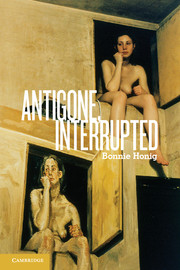Book contents
- Frontmatter
- Contents
- Preface
- Acknowledgments
- Introduction
- Part I Interruption
- 1 Tragedy, maternalism, ethics: toward an agonistic humanism
- 2 “Antigone versus Oedipus,” I: feminist theory and the turn to Antigone
- 3 “Antigone versus Oedipus,” II: the directors’ agon in Germany in Autumn
- Part II Conspiracy
- Notes
- Bibliography
- Index
1 - Tragedy, maternalism, ethics: toward an agonistic humanism
Published online by Cambridge University Press: 05 May 2013
- Frontmatter
- Contents
- Preface
- Acknowledgments
- Introduction
- Part I Interruption
- 1 Tragedy, maternalism, ethics: toward an agonistic humanism
- 2 “Antigone versus Oedipus,” I: feminist theory and the turn to Antigone
- 3 “Antigone versus Oedipus,” II: the directors’ agon in Germany in Autumn
- Part II Conspiracy
- Notes
- Bibliography
- Index
Summary
By insisting on a “common” corporeal vulnerability, I may seem to be positing a new basis for humanism.
Judith ButlerCertain great themes, such as humanism, can be used to any end whatsoever.
James TullyOnly tragedy can deal adequately with humanism on its high horse.
Laurence MichelHumanism has in recent years been making a comeback; not the rationalist universalist variety discredited by post-structuralism and the horrific events of the twentieth century, but a newer variant. This humanism asserts that what is common to humans is not rationality but the ontological fact of mortality, not the capacity to reason but vulnerability to suffering. This mortalist humanism is connected to what has been dubbed recently, “the turn to ethics” or “the ethical turn.” Finitude is said to soften us up for the call of the other, to open us up to the solicitations of ethics and to bypass the intractable divisions of politics. I argue here that even this humanism is implicated in political divisions it claims to transcend and, moreover, that an ethics of mortality and suffering is no adequate replacement for a (post)humanist politics with agonistic intent. Humanists have long found in Greek tragedy an illustration of their ideal but tragedy seems a strange genre on which to pin the celebration of the human. In tragedy, after all, “[e]verything humanistically worthwhile is blighted, then irretrievably cracked; men are made mad, and then destroyed,” says Laurence Michel. Rather than depict a “Human Spirit” that is “autonomous and transcendent,” tragedy debunks such “pretensions” (1961: 634).
- Type
- Chapter
- Information
- Antigone, Interrupted , pp. 17 - 35Publisher: Cambridge University PressPrint publication year: 2013

